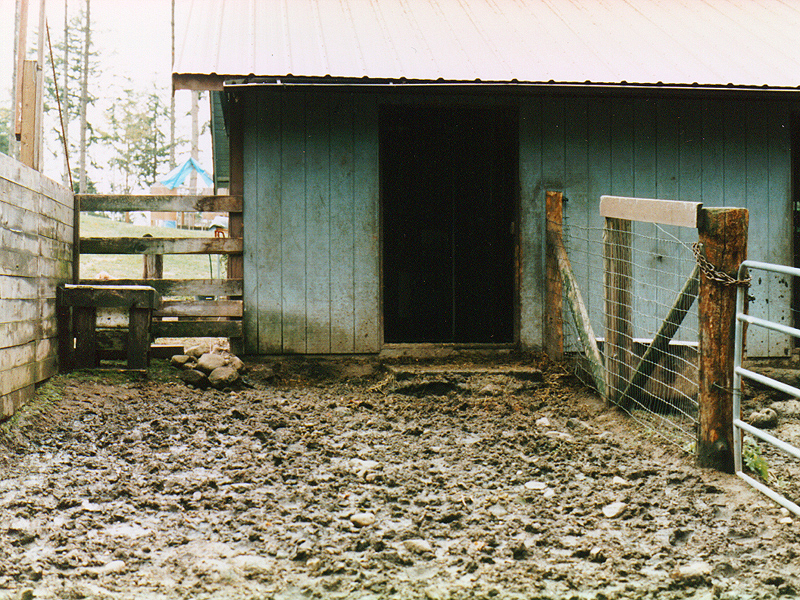The “Golden Rule” for Mud Management on Horse Properties
by Alayne Blickle
Runoff from driveways, parking areas, hillsides or slopes can significantly add to mud problems in confinement areas. February is the time of the year when all the winter rains and melting snow really start adding up, creating muddy messes on horse properties. Environmentally speaking, the golden rule for mud management here is to “keep clean rainwater clean.” This is done by diverting it away from paddocks, buildings, manure piles and high traffic areas. When you do this, nutrients and sediments (from manure and mud) are kept out of the runoff and mud is reduced—all good news! Here are a few tips for improving drainage on horse proprieties.
When tackling drainage issues, first think “slow the flow.” The best and simplest way to reduce surface water runoff is to slow it down, allowing it to infiltrate back into the ground. This is sometimes all that is needed to solve a drainage issue. It will also help recharge the natural ground water hydrology.

Three Ways to “Slow the Flow” on Your Property:
- Cover a sloped driveway or trail with new gravel. Each piece of gravel helps to catch and slow down water traveling down slope towards your barn or shed.
- Divert roof runoff into a grassy swale (a gently sloping depression) or a grass-lined ditch.
- Water bars (like a speed bump for water runoff) which divert water away from an easily eroded or high traffic area.
Each of the following techniques can be useful for intercepting and diverting clean surface water, keeping it out of your paddock and reducing mud:
- French drain lines (a trench filled with gravel or rock or containing a perforated pipe that redirects surface water and groundwater away from an area).
- Diversion ditches (a grassy lined shallow ditch used to reroute the flow of water).
- Dry wells (used with well draining soils, a pit is dug into the ground and filled with large rock. During a heavy rain, rain water fills the well and slowly percolates back into the ground water system).
- A hedgerow or line of native plants which will soak up extra water as it runs towards a building. Use plants which will grow in the winter and are a variety of sizes.

Use these techniques on the outside of your paddocks or high traffic areas so that clean runoff water is intercepted before it becomes a muddy problem. In cases where water is diverted to another area of your property, utilize unused vegetated areas like a corner of your pasture or well-vegetated woods. Never divert surface water directly into an existing water body (such as a creek, pond, or wetlands) as the amount of added water can drastically and unnaturally change water levels. When water levels go up quickly, that increases turbidity and important fish habitat is often ruined or destroyed.
Have other mud, manure and pasture questions? Check out these upcoming Horses for Clean Water events:
Maple Valley, WA
WORKSHOP: Land & Water Stewardship for Livestock & Small Farm Owners
Thursdays, February 18, 25 and March 3, 10, 6:30 pm to 9 pm
FREE! kingcd.eventbrite.com, (425) 282-1949 or signup@kingcd.org
Nampa/Boise, ID
TOUR: BLM Wild Horse Corrals
Saturday, February 20, 9 am to noon
$15, register online at www.nampaparksandrecreation.org or 208-468-5858
Covington, WA
WORKSHOP: Pasture Management and Equine Health and Nutrition
Saturday, February 27, 9 am to noon
FREE! 425-282-1949 or signup@kingcd.org or kingcd.eventbrite.com
Enumclaw, WA
WORKSHOP: Dealing with Mud and Drainage for Horse and Livestock Owners
Saturday, March 12, 9 am to noon
FREE! 425-282-1949 or signup@kingcd.org or kingcd.eventbrite.com
Shelton, WA
WORKSHOP: Dealing with Mud, Drainage and Manure for Horse Owners
Sunday, March 13, 1 to 4 pm
FREE! 360-427-9436 x117 or Katrinka@masoncd.org
Published in February 2016 Issue

Alayne Blickle, a life-long equestrian and educator, is the creator/director of Horses for Clean Water, an award-winning, nationally acclaimed environmental education program that “wrote the book” on caring for horses and land. Known for her enthusiastic, fun and down-to-earth approach, she is an educator and photojournalist who has worked with horses and livestock owners for over 20 years. Alayne teaches and travels throughout North America and abroad, and also runs Sweet Pepper Ranch, an eco-sensitive guest ranch and horse motel in Southwestern Idaho where she and her husband raise top-notch reining horses and beautiful grass hay. For more information contact Alayne at alayne@horsesforcleanwater.com or 206-909-0225.

